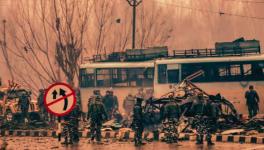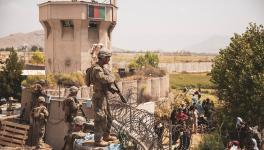Endless Trauma of Teen Kidnapped by Taliban Nine Years Ago
The return of the Taliban in Afghanistan after two decades is no ordinary development. It marks the end of US domination and a new phase of international alignments in the region. In its last stint, the Taliban enforced its strict version of Islam and targeted many it believed supported the United States or its allies. It also recruited fighters who, if they attempted to escape, met with reprisals. Now, many are cautioning against a fresh phase of retaliation. A report prepared by medical doctors and psychiatrists in the United Kingdom, which relates to a residency plea of a young boy who escaped from the Taliban in 2012, illustrates the impact of war, occupation or armed struggle on ordinary people. The teen, now an adult, lives in the UK and is in psychiatric care.
In 2012, when Zabiuddin (name changed to protect identity) was just thirteen, Taliban shooters stormed into his home in the restive Khyber Pakhtunkhwa (KP) province of northwestern Pakistan. They shot his older brother, who died before his eyes. Months later, on Eid-ul-Fitr, Zabiuddin was abducted and taken across the border to Afghanistan. He was introduced to AK-47 assault rifles, hand grenades, Rocket-propelled grenades (RPGs) and other weaponry. For three long years in captivity, the Taliban had him transport weapons and ammunition across its bases in the mountains. He was abused and tortured regularly, but his worst nightmares came true when his captors forced him to watch “betrayers” get beheaded.
One night, when the security forces and the Taliban engaged in a fierce gun battle, Zabiuddin sneaked out and vanished into the darkness. Like any young boy, he went home, and after several months of struggle, found his way into the United Kingdom.
Now twenty, Zabiuddin is an emotionally scarred young man. He lives with the screams of people who were tortured and beheaded before him. The sounds and sights play out in his mind repeatedly. The sounds of gunshots ringing in his mind keep him on edge while the trauma of his torture and abuse in captivity triggers hallucinations. His list of psychological problems is long, and his trauma is sure to last a lifetime.
A seventeen-page report compiled by a team of doctors in the United Kingdom after conducting a psychiatric assessment of Zabiuddin presents a disturbing picture of life under Taliban rule, replete with brutality. The confidential report was submitted in a United Kingdom court in connection with Zabiuddin’s immigration case in 2017. He now lives in the United Kingdom and is still undergoing treatment for psychological issues. He lives with his older brother, a former Taliban fighter, and a British national sister-in-law.
According to the report with this correspondent, Zabiuddin’s horrific saga began in early 2000 in a dusty village on the so-called “North West Frontier Province or NWFP”. Zabiuddin refers to this region where Afghanistan meets Pakistan as “Sarhad”, or border. The Taliban had recruited Zabiuddin’s older brother, and he was trained in their camp in Afghanistan. He desperately wanted to flee the Taliban.
A year later, following the 9/11 terror strikes, the United States and its allies toppled the Taliban-led Islamic Emirate of Afghanistan. In 2004, Zabiuddin escaped, leaving behind his brothers and parents, and settled down in the United Kingdom. In the KP badlands, the Taliban tortured and killed his family, who initially moved from village to village from fear for their lives. After the US-led invasion of Afghanistan, the Taliban was lying low. When they finally regrouped by 2012—the year Zabiuddin got picked up—they hunted down the family and killed his oldest sibling.
Zabiuddin was among 22 children kidnapped by the Taliban on Eid. “They tied our hands and made us walk into Afghanistan and into the Taliban base for 24 hours. Many of us were slapped and beaten up en route,” he tells his doctors.
He wanted to escape but dropped the plan seeing people beheaded for trying to escape, The brutal killings struck fear in him and other captives. Zabiuddin lived in constant fear, braving beatings by the butts of Kalashnikov rifles. He dodged death a few times when bullets just missed him during gunfights that were regular in the war-torn country. During one such skirmish, finally, he escaped from the camp, walked to the Pakistan border and reached home. By then, his parents were living in a refugee camp. He was moved from relative to relative for short stays, as the family feared his recapture by the Taliban.
With nowhere to hide, Zabiuddin’s only option was to leave his country. He and a few others travelled to Calais, a major ferry port in northern France. His worries did not cease in France, for locals assaulted him each time he went to the shops to buy food. A volunteer and social worker finally approached him and learnt his side of events. They found his brother in the United Kingdom. However, it was four years before they were reunited in North Wales in October 2016.
Battle with psychological issues
In the dead of night, when everyone at home is asleep, Zabiuddin remains awake, mostly talking to himself, hearing voices, hallucinating. Nightmares triggered by flashbacks of the beheading he was made to witness hardly allow him to sleep. Vivid images of abuse, sounds of the cries and screams of people being thrashed, haunt him. All night, he hears automatic weapons, which keeps him on edge. Restless and sweating profusely, he peeps out the door and windows, wondering if the Taliban fighters are here to get him. He fears they would behead him, like the others in captivity who made unsuccessful attempts to escape.
For three long years, Zabiuddin experienced hell in the captivity of the Taliban, replete with abuse and torture. Now a free man, his life is no better. Their brutal ways are fresh in his memory even five years after he escaped. It is playing havoc with his mental health.
“Zabi[uddin] endured extreme physical, psychological torture and abuse perpetrated by the Taliban. He has consequently suffered from symptoms of intense anxiety and depression. He suffers from long term sequelae of complex post-traumatic stress disorder along with depressive disorder of severe degree associated with possible psychotic symptoms,” the doctors at a UK hospital, who conducted his psychiatric assessment, concluded.
Zabi’s psychological battles are a massive obstacle to his return to everyday life. “He has passive and fleeting suicidal thoughts but no active suicide plans,” the doctors note.
In 2017, as he walked into the room for his very first interview with the doctors, Zabiuddin, they said, appeared moderately anxious and apprehensive. Casually dressed and well-kempt, he remained tense throughout, as he narrated in detail his experiences. He conversed in Pashto, and his brother translated for the doctors. Except for his brother and sister-in-law, the current whereabouts of his family is unknown.
“His anxiety levels were objectively high but he did respond to reassurance. His attention was low and so were his concentration levels. Throughout the session, he was clearly on the edge as he went about giving graphic details of the abuse and torture he suffered in captivity,” the doctors say of their very first impressions of the young man of Pakistan origin. They noted that Zabiuddin’s speech was coherent and slow in rate and flow, normal in content. “There is evidence of low mood and a sense of despair. His affect was reactive and he expressed fear and anxiety about his future,” they observed.
But it is the multiple scars on the young man’s scalp and a damaged ear leading to one-sided deafness after a Kalashnikov attack that tells the painful story of his suffering and pain in captivity. The doctors say that deafness in one ear worsens his distress and aggravates his mental health issues. “He needs a long term treatment and needs continuous risk-monitoring,” they wrote.
Zabiuddin’s brother told the doctors that he suffers from mood swings—he swings from normal to angry or snappy within minutes. The doctors also say that he cries spontaneously, is irritable and has a poor appetite. The doctors note that Zabi, who has no history of psychiatric illness as a child, now “...suffers from insomnia, anhedonia (loss of interest in activities which he previously used to enjoy”.
They say he has passive suicidal thoughts. “On some occasions, he has tried to superficially burn his left arm (deliberate self harm). He has paranoid thoughts, checks food prepared by family and also checks outside his home in the UK for possible Taliban.”
The psychiatrists found his cognitive functions grossly intact on superficial examination, including appropriate time, place, and personal orientation. “Though he has poor self-worth and self confidence, he expressed some motivation to get better,” they wrote. They added that fear of imminent mortal danger, having some basis in reality, has superimposed on his tendency to be anxious, which could prove “extremely detrimental” to his fragile mental health. “His PTSD (Post Traumatic Stress Disorder) is complex in nature and are making it difficult for him to carry on with normal life.”
PTSD patients can be expected to recover, but the conditions may become chronic in a small proportion of cases and even lead to “enduring personality change,” the doctors explain.
The author is an independent journalist. The views are personal.
Get the latest reports & analysis with people's perspective on Protests, movements & deep analytical videos, discussions of the current affairs in your Telegram app. Subscribe to NewsClick's Telegram channel & get Real-Time updates on stories, as they get published on our website.
























